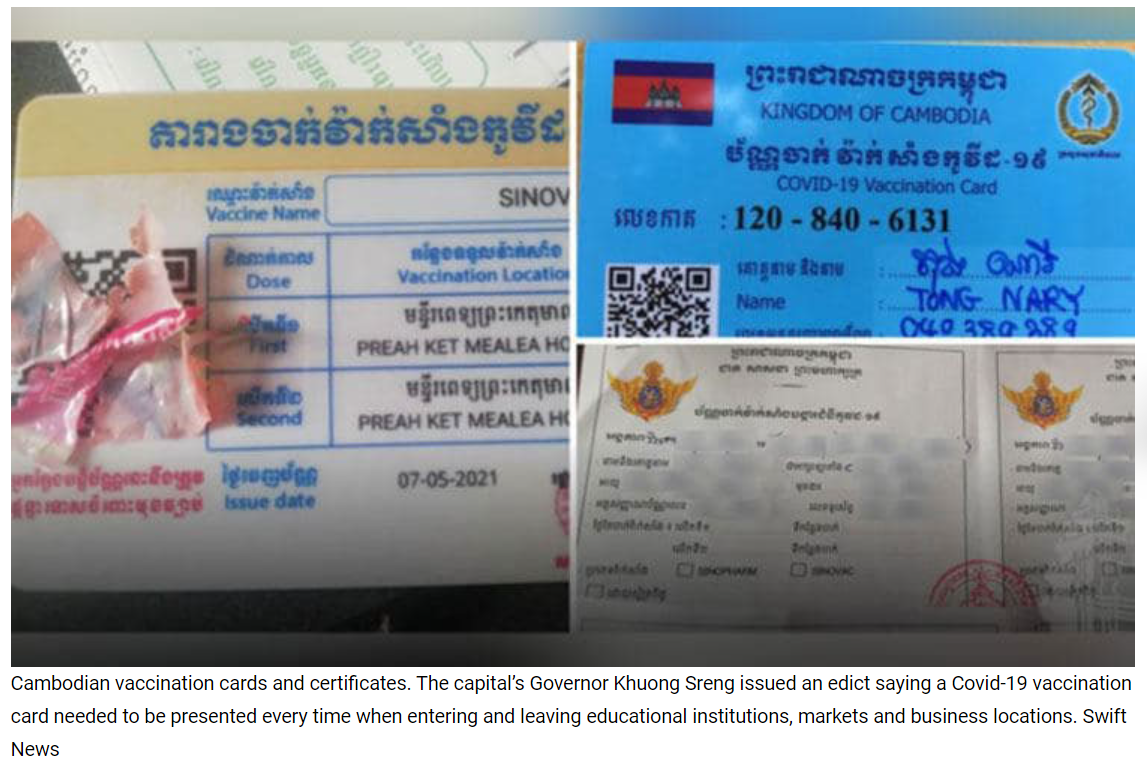Cambodia: Vaccination card ruling causes confusion in capital among traders and their customers
A City Hall ruling on vaccination cards has provoked a mixed reaction from local and foreign business operators in Phnom Penh.
The capital’s Governor Khuong Sreng issued an edict on Oct 5 saying a Covid-19 vaccination card needed to be presented every time when entering and leaving educational institutions, markets and business locations. The ruling applies to all business premises and there are no concessions for people who have not been vaccinated.
“No one is exempted, even those with a medical certificate from the Ministry of Health,” Sreng said this week. “I understand that in practice international vaccine documents are accepted for entry: This is in practice,” said Anthony Galliano, president of the American Chamber of Commerce in Cambodia. He added that pregnant women and people with underlying health conditions who have not been vaccinated would face problems if the ruling is applied as strictly as the governor’s comments suggest.
“We have raised these issues to the government and more particularly to the representatives of the Ministry of Tourism,” said Arnaud Darc, president of the Cambodia Restaurant Association. “They are aware and working toward finding solutions to all of these issues.”
One local small business owner who sells clothes in a central Phnom Penh market said she had not been vaccinated because of her allergies. “I have been told customers will not be allowed into the market without a card. They are taking it really seriously this time,” said the woman, nicknamed Nana, who did not wish to be named. “I have not been asked to show a vaccination certificate yet. I don’t know what I’ll do if they ask. I can’t afford to shut down my stall.”
The European Chamber of Commerce says it has not yet been made aware of any problems for its members as a result of the Phnom Penh governor’s ruling.“The instruction requires the presentation of a vaccination card issued by the Ministry of Health, by the Ministry of National Defense or a ‘COVID-19 vaccination certificate’,” said EuroCham Advocacy Manager Noe Schellinck. “We believe the latter should provide the necessary flexibility for expats – and in the future possibly also tourists – who have been vaccinated overseas and who are, for example, in possession of the EU digital certificate.
The underlying idea of the instruction is to prove that you are vaccinated for the sake of public health: It is not about showing that you are the mere owner of a vaccination card. The instruction also does not restrictively list which vaccines are recognised (as is the case in certain foreign countries), so we see no explicit obstacles for vaccines used overseas, such as Pfizer Comirnaty or Moderna Spikevax. As long as you are able to demonstrate that you are vaccinated by means of an official vaccination certificate, it occurs to us that the PPCA instruction applies the principle of ‘function over form’,” he said. This proved to be the case for one expat who was vaccinated in the UK. Britain does not issue vaccination cards and only issues travel letters to people who have a UK address registered with their doctor.
Source: https://www.khmertimeskh.com/50951552/vaccination-card-ruling-causes-confusion-in-capital-among-traders-and-their-customers/


 Thailand
Thailand




